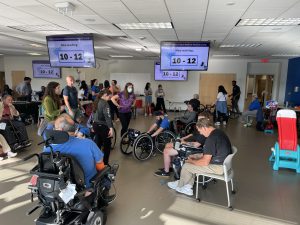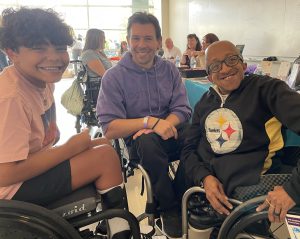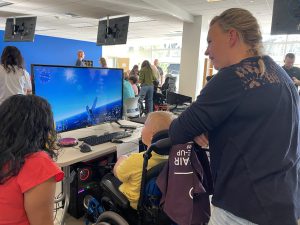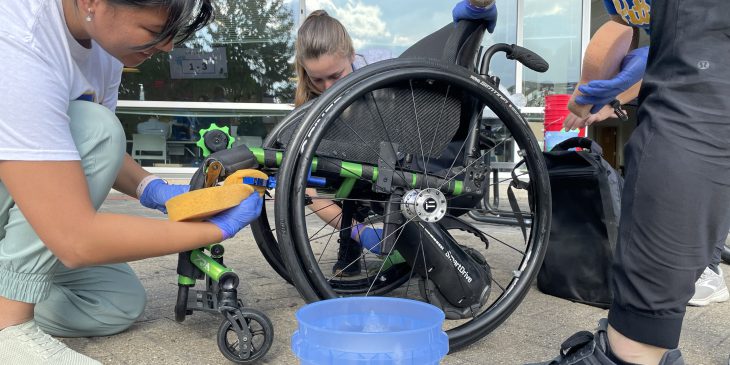“I hate washing my wheelchair, and it’s sometimes hard getting into the nooks and crannies, so getting a little extra support and extra eyes on the chair is great,” said Chris Mielo, who has used a wheelchair since childhood.
Mielo’s was one of nearly 50 wheelchairs washed by volunteers at UPMC’s Wheelchair Wash and Tuneup last month. The annual event invites wheelchair users from the community and their families to network, socialize and get some free TLC for their chairs.

The wheelchair wash is a good opportunity for wheelchair users to network and learn about local resources, services and activities.
In addition to the wash, the wheelchairs are given a bit of a tune up. Interestingly, one of the biggest problems involves strands of human and animal hair that get caught in the wheels.
“One of the most important things that I like to do here is get the hair in my casters taken out,” said Lester Bennett. “It’s hard to do it myself, so to be able to hop out of the chair and have somebody else do that, it’s one of the big things I’m here to get done.”
A wheelchair is one of the most– used devices for people with disabilities, enabling independence and improving quality of life. One in 10 Americans uses a wheelchair with an estimated one-half of these wheelchairs breaking down during a typical six-month period, according to research from the University of Pittsburgh. Repairs can cost hundreds of dollars, and without a backup chair, wheelchair users may be unable to perform daily tasks both inside and outside the home.
“Wheelchair maintenance is not a covered item by most insurances, so most people are doing it themselves or they’re not doing it at all and then things break,” said event organizer Rachel Hibbs, a University of Pittsburgh professor and UPMC physical therapist. “Repairs are covered by insurance, but we can do things to avoid some breakdowns, to prevent people from getting stranded or being stuck at home.”

Participants socialize while waiting to have their chairs washed.
Bennett and Mielo weren’t there just to have their wheelchairs washed and undergo maintenance — they were also on hand to share information about resources, services and products available to wheelchair users. Mielo is a communications manager at the disability support nonprofit Achieva, while Bennett is a patient care coordinator at Laural Medical Solutions, helping to identify potential problems with attendees’ wheelchairs. They were among some 20 local community organizations on hand to provide additional support and information for wheelchair users and their families.

A child tries out an adaptive gaming system.
Hibbs said they’ve had more children who use wheelchairs attend the event in the last couple of years, so they’ve added fun activities, like wheelchair basketball and a collaborative painting project. She also says many former UPMC Mercy rehab inpatients attend the event, and it’s a good way to introduce them to the disability community in Pittsburgh.
“When you have a disability, it can sometimes feel very isolating, and you can feel like you’re on your own. Sometimes you just don’t know what’s out there,” Mielo said. “It’s the informal connections made through the wheelchair wash that often prove to be the most valuable. The peer-to-peer support is so important. There are things I’ve learned from other wheelchair users, just from having that one-on-one conversation about things that I’m struggling with.”








